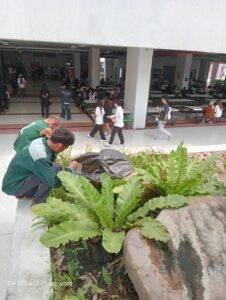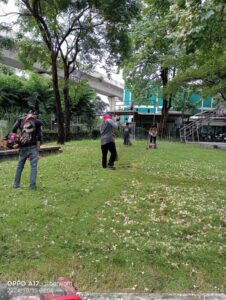

SPU Takes Action to Combat Invasive Alien Species, Protecting Campus Biodiversity
In a bold move to preserve local ecosystems and align with global sustainability frameworks, Sripatum University (SPU) has implemented a proactive policy to reduce the impact of invasive alien species (IAS) on campus. Aligned directly with SDG 15.3.4, this initiative showcases SPU’s leadership in land-based biodiversity conservation.
SPU’s strategy involves four key components: green space management, species surveillance and removal, community awareness campaigns, and collaborative research. The university’s Office of Facilities plays a central role in preventing the introduction of non-native flora, maintaining ecological balance across all green zones within campus boundaries. These efforts reinforce SDG 15.3.4, which calls for institutions to reduce the impacts of invasive (alien) species.
Additionally, the university fosters a culture of environmental responsibility through awareness campaigns, workshops, and student-led projects, fulfilling aspects of SDG 4.3.4 and 4.3.5. Research and innovation are at the core of the programme, as SPU funds studies on IAS impact and management, encouraging new solutions and cross-sectoral collaboration, in line with SDG 9.1.1 and SDG 17.2.5.
Environmental management policies also align with SDG 12.2.5, emphasizing responsible use of biological resources and ecosystem sustainability. With its surveillance system, SPU actively contributes to the health of its land ecosystems and supports goals such as SDG 13 (Climate Action) and SDG 11 (Sustainable Cities and Communities), as healthy land ecosystems mitigate environmental shocks and enhance urban resilience.
SPU’s work serves as a national example of how educational institutions can lead ecosystem restoration through practical, community-integrated solutions. The university’s dedication to biodiversity underpins its broader SDG commitment, protecting life on land for generations to come.
ข่าวในภาษาไทย | News in Thai
มหาวิทยาลัยศรีปทุมเดินหน้าลดผลกระทบจากชนิดพันธุ์ต่างถิ่น เพื่อคงไว้ซึ่งความหลากหลายทางชีวภาพในพื้นที่มหาวิทยาลัย
มหาวิทยาลัยศรีปทุม (SPU) เดินหน้าดำเนินนโยบายเชิงรุกในการลดผลกระทบจากชนิดพันธุ์ต่างถิ่น (Alien Species) ที่อาจส่งผลกระทบต่อระบบนิเวศในพื้นที่มหาวิทยาลัย โดยสอดคล้องกับเป้าหมาย SDG 15.3.4 ซึ่งเน้นการลดผลกระทบของสิ่งมีชีวิตต่างถิ่นที่รุกรานระบบนิเวศทางบก
นโยบายนี้ประกอบด้วย 4 แกนหลัก ได้แก่ การบริหารพื้นที่สีเขียว การเฝ้าระวังและกำจัดชนิดพันธุ์ต่างถิ่น การรณรงค์ให้ความรู้แก่ชุมชน และการวิจัยและพัฒนานวัตกรรม โดยมีสำนักงานอาคารสถานที่เป็นหน่วยงานหลักในการดำเนินการ เฝ้าระวังไม่ให้นำพืชต่างถิ่นเข้ามาในพื้นที่ และควบคุมความสมดุลของระบบนิเวศภายในรั้วมหาวิทยาลัย
ควบคู่กัน SPU ยังดำเนินกิจกรรมสร้างความตระหนักรู้ เช่น การอบรม สัมมนา และโครงการนำโดยนักศึกษา ส่งเสริมเป้าหมาย SDG 4.3.4 และ 4.3.5 ในด้านการเรียนรู้ตลอดชีวิตและการมีส่วนร่วมของสาธารณะ อีกทั้งยังสนับสนุนการวิจัยและพัฒนานวัตกรรมใหม่ๆ สู่การจัดการที่ยั่งยืน ตรงกับเป้าหมาย SDG 9.1.1 และ SDG 17.2.5 ที่เน้นการพัฒนาองค์ความรู้และความร่วมมือเชิงนโยบายกับหน่วยงานภายนอก
นโยบายด้านสิ่งแวดล้อมของ SPU ยังสอดรับกับ SDG 12.2.5 ในด้านการบริหารจัดการทรัพยากรชีวภาพอย่างมีความรับผิดชอบ และส่งเสริมระบบนิเวศทางบกที่แข็งแรงซึ่งเชื่อมโยงกับ SDG 13 (การรับมือกับการเปลี่ยนแปลงสภาพภูมิอากาศ) และ SDG 11 (เมืองและชุมชนที่ยั่งยืน) เนื่องจากระบบนิเวศที่ดีจะช่วยลดความเสี่ยงจากภัยพิบัติและเพิ่มความยืดหยุ่นให้ชุมชนเมือง
มหาวิทยาลัยศรีปทุมแสดงให้เห็นถึงบทบาทนำในฐานะสถาบันการศึกษาที่ขับเคลื่อนการอนุรักษ์ระบบนิเวศผ่านแนวทางที่เป็นรูปธรรม เชื่อมโยงคน วิทยาศาสตร์ และชุมชนเข้าด้วยกัน เพื่อรักษาชีวิตบนผืนแผ่นดินอย่างยั่งยืน


